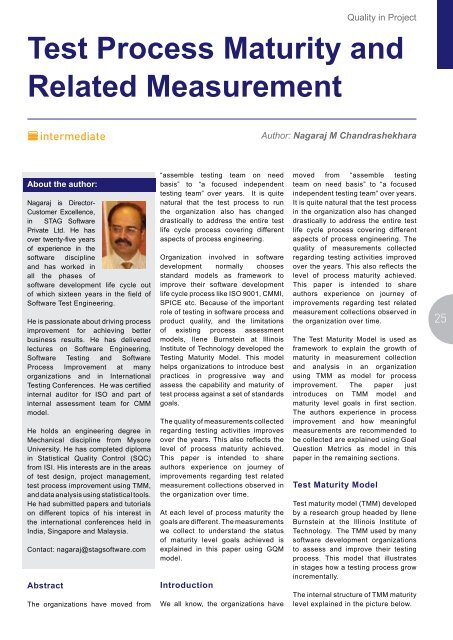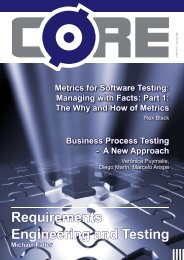Comparison of Change Management Systems
Comparison of Change Management Systems
Comparison of Change Management Systems
You also want an ePaper? Increase the reach of your titles
YUMPU automatically turns print PDFs into web optimized ePapers that Google loves.
Quality in Project<br />
Test Process Maturity and<br />
Related Measurement<br />
basic<br />
intermediate<br />
advanced<br />
About the author:<br />
Nagaraj is Director-<br />
Customer Excellence,<br />
in STAG S<strong>of</strong>tware<br />
Private Ltd. He has<br />
over twenty-five years<br />
<strong>of</strong> experience in the<br />
s<strong>of</strong>tware discipline<br />
and has worked in<br />
all the phases <strong>of</strong><br />
s<strong>of</strong>tware development life cycle out<br />
<strong>of</strong> which sixteen years in the field <strong>of</strong><br />
S<strong>of</strong>tware Test Engineering.<br />
He is passionate about driving process<br />
improvement for achieving better<br />
business results. He has delivered<br />
lectures on S<strong>of</strong>tware Engineering,<br />
S<strong>of</strong>tware Testing and S<strong>of</strong>tware<br />
Process Improvement at many<br />
organizations and in International<br />
Testing Conferences. He was certified<br />
internal auditor for ISO and part <strong>of</strong><br />
internal assessment team for CMM<br />
model.<br />
He holds an engineering degree in<br />
Mechanical discipline from Mysore<br />
University. He has completed diploma<br />
in Statistical Quality Control (SQC)<br />
from ISI. His interests are in the areas<br />
<strong>of</strong> test design, project management,<br />
test process improvement using TMM,<br />
and data analysis using statistical tools.<br />
He had submitted papers and tutorials<br />
on different topics <strong>of</strong> his interest in<br />
the international conferences held in<br />
India, Singapore and Malaysia.<br />
Contact: nagaraj@stags<strong>of</strong>tware.com<br />
Abstract<br />
The organizations have moved from<br />
“assemble testing team on need<br />
basis” to “a focused independent<br />
testing team” over years. It is quite<br />
natural that the test process to run<br />
the organization also has changed<br />
drastically to address the entire test<br />
life cycle process covering different<br />
aspects <strong>of</strong> process engineering.<br />
Organization involved in s<strong>of</strong>tware<br />
development normally chooses<br />
standard models as framework to<br />
improve their s<strong>of</strong>tware development<br />
life cycle process like ISO 9001, CMMI,<br />
SPICE etc. Because <strong>of</strong> the important<br />
role <strong>of</strong> testing in s<strong>of</strong>tware process and<br />
product quality, and the limitations<br />
<strong>of</strong> existing process assessment<br />
models, Ilene Burnstein at Illinois<br />
Institute <strong>of</strong> Technology developed the<br />
Testing Maturity Model. This model<br />
helps organizations to introduce best<br />
practices in progressive way and<br />
assess the capability and maturity <strong>of</strong><br />
test process against a set <strong>of</strong> standards<br />
goals.<br />
The quality <strong>of</strong> measurements collected<br />
regarding testing activities improves<br />
over the years. This also reflects the<br />
level <strong>of</strong> process maturity achieved.<br />
This paper is intended to share<br />
authors experience on journey <strong>of</strong><br />
improvements regarding test related<br />
measurement collections observed in<br />
the organization over time.<br />
At each level <strong>of</strong> process maturity the<br />
goals are different. The measurements<br />
we collect to understand the status<br />
<strong>of</strong> maturity level goals achieved is<br />
explained in this paper using GQM<br />
model.<br />
Introduction<br />
We all know, the organizations have<br />
Author: Nagaraj M Chandrashekhara<br />
moved from “assemble testing<br />
team on need basis” to “a focused<br />
independent testing team” over years.<br />
It is quite natural that the test process<br />
in the organization also has changed<br />
drastically to address the entire test<br />
life cycle process covering different<br />
aspects <strong>of</strong> process engineering. The<br />
quality <strong>of</strong> measurements collected<br />
regarding testing activities improved<br />
over the years. This also reflects the<br />
level <strong>of</strong> process maturity achieved.<br />
This paper is intended to share<br />
authors experience on journey <strong>of</strong><br />
improvements regarding test related<br />
measurement collections observed in<br />
the organization over time.<br />
The Test Maturity Model is used as<br />
framework to explain the growth <strong>of</strong><br />
maturity in measurement collection<br />
and analysis in an organization<br />
using TMM as model for process<br />
improvement. The paper just<br />
introduces on TMM model and<br />
maturity level goals in first section.<br />
The authors experience in process<br />
improvement and how meaningful<br />
measurements are recommended to<br />
be collected are explained using Goal<br />
Question Metrics as model in this<br />
paper in the remaining sections.<br />
Test Maturity Model<br />
Test maturity model (TMM) developed<br />
by a research group headed by Ilene<br />
Burnstein at the Illinois Institute <strong>of</strong><br />
Technology. The TMM used by many<br />
s<strong>of</strong>tware development organizations<br />
to assess and improve their testing<br />
process. This model that illustrates<br />
in stages how a testing process grow<br />
incrementally.<br />
The internal structure <strong>of</strong> TMM maturity<br />
level explained in the picture below.<br />
25



